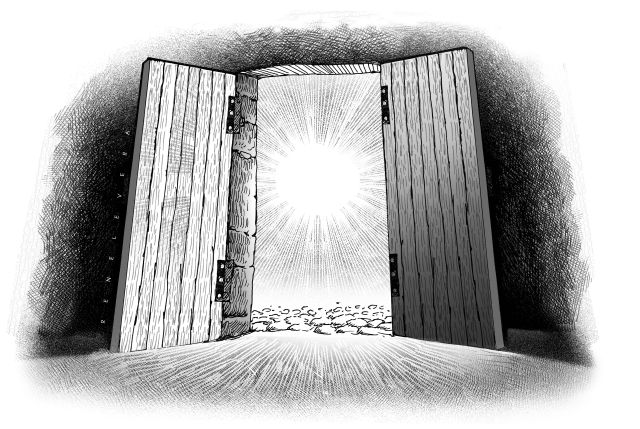Lyndon Johnson called Carl Sandburg “America.” His experience — as milk wagon driver, hotel porter, bricklayer, farm laborer, servant, coal heaver, and then as poet, journalist, novelist, writer of children’s literature — was a fabric into which many fibers of American life wove themselves.
I particularly remember Sandburg for his poem, “Chicago,” with its celebrated first lines (“Hog Butcher for the World, / Tool Maker, Stacker of Wheat, / Player with Railroads and the Nation’s Freight Handler; / Stormy, husky, brawling, / City of the Big Shoulders…”) and the short imagist “Fog” (“The fog comes on little cat feet. // It sits looking / over harbor and city / on silent haunches / and then moves on.”).
I’m here concerned with another short poem of Sandburg’s, “Doors,” which, while it does not have the impact of “Fog,” a well-anthologized piece, similarly exemplifies Sandburg’s deft touch, which resembles that of Chinese brush painting.
An open door says, “Come in.”
A shut door says, “Who are you?”
Shadows and ghosts go through shut doors.
If a door is shut and you want it shut,
why open it?
If a door is open and you want it open,
why shut it?
Doors forget but only doors know what it is
doors forget.
One may treat the poem as about choice, and the need for consistency. An open door means opportunity, an invitation to act, for one to take at the flood, or evermore lose when the door closes. A shut door is a shut door, and one should not think of entering it — one might desire something, or to be something, and never ever get or become what one yearns for. And nothing passes through shut doors except our imagined fears — “shadows and ghosts.” And then, in case one has decided, one should not backtrack and should just carry on with his choice — if one wants a door shut, why open it, or if open, why shut it? Lastly, if doors could remember, what would they tell us about arrivals and departures? But because they cannot remember, being just doors, they alone know what they have forgotten, which is everything.
“Doors” calls up something that Jesus said, which Luke mentions in his Gospel: “After the master of the house has arisen and locked the door, then will you stand outside knocking and saying, ‘Lord, open the door for us.’
He will say to you in reply, ‘I do not know where you are from.’ And you will say, ‘We ate and drank in your company and you taught in our streets.’
Then he will say to you, ‘I do not know where you are from. Depart from me, all you evildoers!’ And there will be wailing and grinding of teeth when you see Abraham, Isaac, and Jacob and all the prophets in the kingdom of God and you yourselves cast out.”
Jesus was then traveling through the towns and villages toward Jerusalem when someone asked, “Lord, will only a few people be saved?” Jesus’ initial answer was “strive to enter through the narrow gate.” But he went on to talk about the kingdom of heaven, comparing it to a celebration which many ignored and decided to crash only after the master had locked the door. They had come too late, for which the master disowned them despite their previous association — they had eaten and drunk with him and he had taught in their streets.
There is a time for everything, and a season for every activity under the heavens, says Ecclesiastes, and clearly those who found the door shut had overspent their time to rediscover the Lord and change their lives — and be admitted to recline at table in the kingdom of God. To them, Sandburg addresses this line from his poem, “A shut door says, ‘Who are you?’”
Sometimes though, a shut door is really open because it is unlocked. And, in a way, even though we have caused the shutting of the door through our indifference or malice, thanks to God’s mercy, it may remain unlocked. Because did not the father daily scan the road for the return of his prodigal son? The father’s love was a door that forgot to shut itself and at the same time knew exactly what it had forgotten.
Disclaimer: The comments uploaded on this site do not necessarily represent or reflect the views of management and owner of Cebudailynews. We reserve the right to exclude comments that we deem to be inconsistent with our editorial standards.

